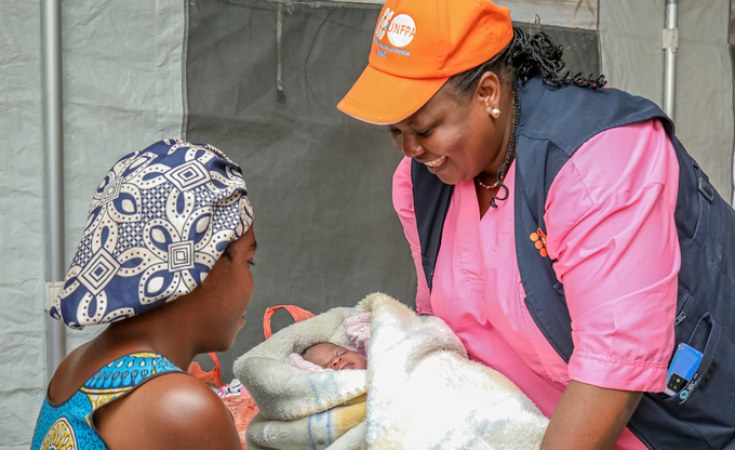NORTH KIVU PROVINCE, Democratic Republic of the Congo - Although heavily pregnant and in pain, Kaindo Bembeleza waited patiently along with dozens of other women on a row of benches under a tarpaulin tent.
The women were hoping to be seen by a team of midwives at a mobile clinic run by UNFPA, the UN sexual and reproductive health agency, set up in the Bulengo camp for people displaced by fierce fighting and relentless insecurity in North Kivu province.
For Ms. Bembeleza, the visit would turn out to be much more eventful than she thought. "At the antenatal consultation, she had intense back pains and felt unwell," said Dorcas Rhubaki, one of the clinic's midwives.
She was swiftly transferred to the examination room, where another midwife, Solange Munguiko Gasana, tried to identify the problem.
"When she arrived, we wanted to examine the cervix," said Ms. Gasana. "But suddenly her water broke and I noticed the baby's head... 15 minutes later, she gave birth."
Believing she had another month to go, the young mother-to-be was surprised to learn she was in fact full term at nine months pregnant. Luckily for mother and baby, the delivery went smoothly and the mobile health team ensured they were safe to be released.
One of the only options for thousands of women and girls to access essential sexual and reproductive health care, the clinic is one of three set up by UNFPA in displacement sites in North Kivu province. The facilities support pregnant women and newborns as well as providing medical treatment for survivors of gender-based violence and referrals to legal and psychological services as needed.
Zero maternal deaths at the Bulengo mobile clinic
The Bulengo camp is currently sheltering over 100,000 people displaced by the deepening crisis in eastern areas of the Democratic Republic of the Congo. Millions have been caught up in the violence and are increasingly vulnerable to climate disasters, disease outbreaks and a severe lack of basic services.
For the estimated 220,000 pregnant and displaced women, of whom more than 4,500 will give birth each month with no safe refuge or secure access to health care, the situation is critical.
Supporting an average of four deliveries per day, the presence of midwives at the mobile clinic can often mean the difference between life and death. So far for every pregnant woman in this displacement camp, it has meant life.
Since it was set up in February 2023, the clinic has recorded zero maternal deaths - a staggering achievement in itself, but especially so in the Democratic Republic of the Congo, where three women die every hour during labour or from pregnancy-related conditions - one of the world's highest maternal mortality rates.
This year, UNFPA-supported health facilities and mobile clinics have made childbirth safe for more than 30,000 women in eastern provinces, with some 15,000 women accessing mobile clinics like the one Ms Bembeleza used.
Skilled midwives are available and equipped to meet women's and newborns' needs 24 hours a day, every day. "It's a relief for pregnant women and survivors of violence - they can now access health care without having to travel long distances," explained Sifa Ndeze, one of the midwives.
"As an internally displaced person myself, working at the mobile clinic means I can continue to practise my profession and assist these displaced women."
Rippling consequences amid a spiralling crisis
In the Ituri, North Kivu and South Kivu provinces, some 5.5 million people are internally displaced, urgently in need of access to functioning health facilities, contraception, post-rape support, and emergency obstetric care. Around 2.2 million pregnant and breastfeeding women will also face acute malnutrition in 2023.
Even where these services are available, reaching them can be impossible or fraught with danger. The consequences are far-reaching: More women could die during pregnancy and childbirth and there are increased vulnerabilities to sexually transmitted infections, perpetuating cycles of poverty and gender inequality.
The crisis in the Democratic Republic of the Congo is only intensifying. To continue safeguarding unhindered access to critical sexual and reproductive health services and help women and girls live free from violence, UNFPA requires over $18 million over the next 6 months.
As UNFPA Executive Director Dr. Natalia Kanem said, "[This] support is essential. It not only ensures that we meet women's most urgent needs, but also helps them to move beyond crises to find hope and opportunity, often against all odds."


